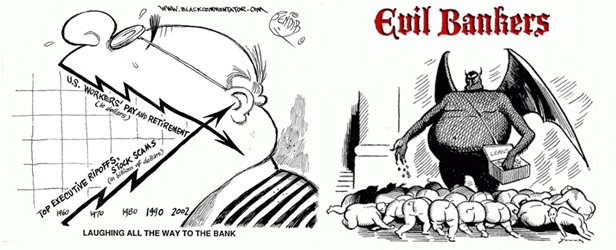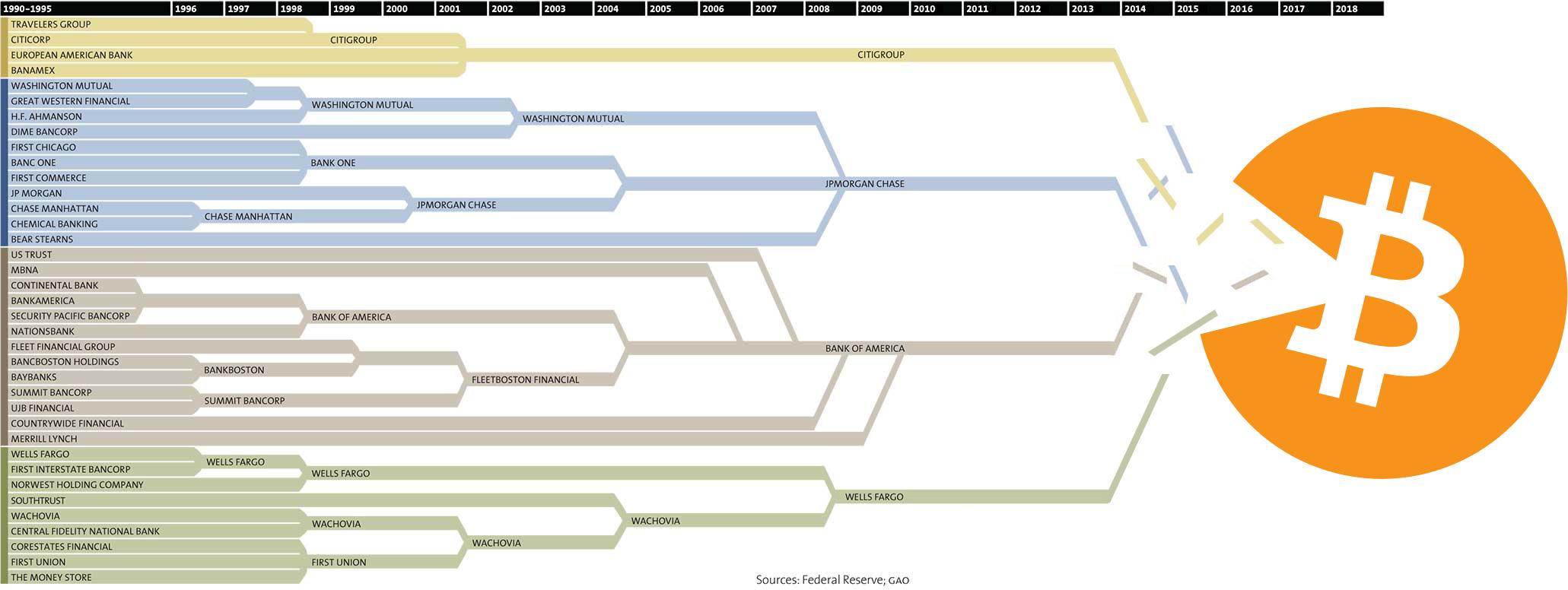A recent blog post titled “When Banks Become the Lawmakers” sparked a realization that banks, and companies that provide financial services in general, are now doing much more than that.
In a utopian world of free markets, the interests of any private corporation including banks would need to balance out against the interests of the consumers. In today’s world of continuously growing government, however, the now 3-way scale is heavily skewed against the consumer.
The Problem: The debts in the western economies have reached levels unlike anything in history. As a lifetime of work by Martin Armstrong demonstrates, all great dynasties from Athens to Rome eventually went to great lengths to confiscate the maximum amount of wealth from its citizens to prevent the inevitable collapse. So it is not surprising that today, the US as the global supper power has deputized financial institutions to levels not seen before. While at the same time the common view on the street is that the financial institutions are the demons in the equation.

The Outcome: The hunt for Tax Revenue is reaching new levels as stricter enforcement of laws like FATCA along with filling out FBAR paperwork. Banks can now be held legally liable or be boycotted from the global financial markets if they do not collect all information on their customers and report certain things to the authorities. Perhaps many of these laws have always been on the books, but it’s the level of enforcement that maters.
Domestically in the US, it’s becoming very clear that every transaction is being monitored. Most people probably know that all transactions over US$10,000 are monitored by the FBI even though that amount is definitely not worth what it was when the law was put in place.
Recent incidents however, are demonstrating that even small transactions are monitored as well. Most likely it’s because banks have gotten to a point where everything is suspicious to appease the government that is demanding a report on anything they feel might be a tax avoidance. In this example, a Mexican restaurant had its bank account (with an ‘unreasonable’ sum of US$33,000) seized, all because this small cash-only business was always making deposits of less than US$10,000.
The fines in regard to those the government deems as being tax evaders are reaching unrealistic levels. In cases of unreported foreign accounts, it is now impossible to tell whether these fines were meant as a deterrent, or simply as a way to “confiscate the car” because the driver was either lazy, forgot or decided not to turn on his signal when switching lanes.
For a hypothetical example, let’s say someone is holding US$1 million in a foreign account that was never declared to the US Government in an FBAR filing. After four years of depriving the US Government of its birthright to taxes on the interest, this account earning 1% a year in interest would come with a tax bill of approximately US$14,000 total.
However, if the bank was to report the account holder to the US authorities, the regulation calls for a penalty of up to 50% the account’s value for every year of non-reporting. So the IRS can go after the account holder for over US$2 Million or approximately double the value of the account.
Before anyone says that their government would never do that, and perhaps when the law was put on the books that type of overreach was not in consideration, it was exactly what was done in the case of Carl Zwerner of Miami. In a more egregious example, Ty Warner, the brains behind the Beanie Baby craze, was fined US$54 million for keeping money in foreign accounts that deprived the United States of less than US$1 million in interest tax revenue.
He will forever be branded as a tax cheat by the Main Stream Media, but more importantly, anyone who thinks the government will put the US$54 million to a better use than this entrepreneur, will have a tough time surviving in the near future as the collapse of the unaffordable socialist system unfolds.
One of the worst things that the financial industry is currently doing is choosing who can and can’t operate accounts in order to appease the Government. We all know about the trouble the Bitcoin industry has had in maintaining banking relationships, but it appears that they are just scared of any advancement in technology and privacy. Lately it seems that
PayPal is shutting down accounts on a whim; with perhaps one of their most high-profile incidents came with ProtonMail’s crowd funding account. The inquiry yielded the following statement from a PayPal representative to Andy Yen, CEO of ProtonMail:
“He questioned whether ProtonMail is legal and if we have government approval to encrypt emails.”
We already see this trend happening in the Bitcoin space as well as with recent reports about Coinbase selectively shutting down accounts. Of course, the problem is not that Coinbase wants to shut down anyone’s account, it’s all because they are interfacing with the legacy fiat financial system, and they are not to be alone. Companies like Circle and approved exchanges will all do this government bidding. Once again, there is a very blurry line about who is in control between the consumer, the service provider and the government, with its arbitrary financial laws preying upon everyone.

The Solution: Attempting to change the system from the inside by electing the right politician or adding more laws on top of laws will never solve the problem. And there are too many incidents to name of what happens to those who attempt to expose the truth starting with Edward Snowden. Perhaps this is one of the reasons Satoshi Nakamoto remained anonymous when bringing Bitcoin and Blockchain Technology to the world.
As Bitcoin pioneers like Charlie Shrem are now going to jail for spreading the power of new technology around the world, it’s clear that the solutions need to be built into the system. The more dependence and interaction the Blockchain has with the legacy financial system, the more these innovative new companies would be expected to be law enforcement deputies.
Bitcoin is providing the power for everyone to be their own bank, but the public must first understand why this is important and start taking steps to be more responsible when it comes to securing their wealth.
This movement began because financial law enforcers like PayPal along with Visa and Mastercard decided to do the government’s bidding with their dislike for Wikileaks as they shut down their accounts. We might look back upon those days in irony of how the financial law enforcers were instrumental in their own demise.
Let’s just hope that the next time there is a similar overreach, whether by the legacy financial system or Bitcoin companies trying to appease debt ridden Governments, it drives more and more people into direct peer-to-peer crypto currency transactions.

